玄奘 翻译家
玄奘:西天取经的佛经翻译家
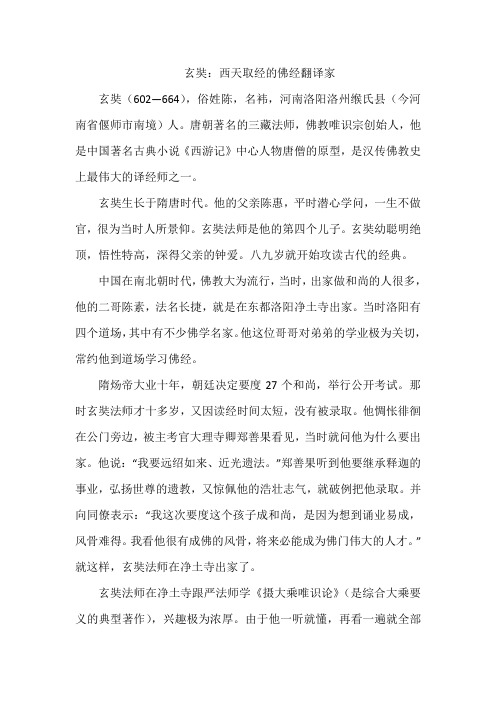
玄奘:西天取经的佛经翻译家玄奘(602—664),俗姓陈,名袆,河南洛阳洛州缑氏县(今河南省偃师市南境)人。
唐朝著名的三藏法师,佛教唯识宗创始人,他是中国著名古典小说《西游记》中心人物唐僧的原型,是汉传佛教史上最伟大的译经师之一。
玄奘生长于隋唐时代。
他的父亲陈惠,平时潜心学问,一生不做官,很为当时人所景仰。
玄奘法师是他的第四个儿子。
玄奘幼聪明绝顶,悟性特高,深得父亲的钟爱。
八九岁就开始攻读古代的经典。
中国在南北朝时代,佛教大为流行,当时,出家做和尚的人很多,他的二哥陈素,法名长捷,就是在东都洛阳净土寺出家。
当时洛阳有四个道场,其中有不少佛学名家。
他这位哥哥对弟弟的学业极为关切,常约他到道场学习佛经。
隋炀帝大业十年,朝廷决定要度27个和尚,举行公开考试。
那时玄奘法师才十多岁,又因读经时间太短,没有被录取。
他惆怅徘徊在公门旁边,被主考官大理寺卿郑善果看见,当时就问他为什么要出家。
他说:“我要远绍如来、近光遗法。
”郑善果听到他要继承释迦的事业,弘扬世尊的遗教,又惊佩他的浩壮志气,就破例把他录取。
并向同僚表示:“我这次要度这个孩子成和尚,是因为想到诵业易成,风骨难得。
我看他很有成佛的风骨,将来必能成为佛门伟大的人才。
”就这样,玄奘法师在净土寺出家了。
玄奘法师在净土寺跟严法师学《摄大乘唯识论》(是综合大乘要义的典型著作),兴趣极为浓厚。
由于他一听就懂,再看一遍就全部记得,很使大家惊奇,于是就请他担任复述。
这时他虽然还是一个小孩子,可是已经引起大家的注意了。
四年后,他同哥哥离开洛阳到四川,玄奘法师是个求知欲极强的人,他精通佛教经典,在四川已不能满足他的求知欲。
因而又想东归访求高人,不料哥哥坚决拦阻,不肯放行。
他不得已,只好私自和商人结伴乘船东下,路过荆州天皇寺,讲学半年;再向北走到相州(汤阴县),向休法师质疑问难;到赵州,跟深法师学《成实论》(佛教小乘“经部”的要典)。
然后才入长安大觉寺,跟岳法师学《俱舍论》(小乘“一切有部”的要典)。
玄奘的翻译理论和实践及其对当代汉语外译的价值与影响

玄奘的翻译理论和实践及其对当代汉语外译的价值与影响【摘要】玄奘西行取经17载,归国后毕其生于佛经翻译,其译著从数量和质量上都达到了中国佛经翻译史上的高峰,被誉为“有史以来翻译家中的第一人”。
玄奘践行的翻译观开创了中国译经史的新风格和新局面,本文通过剖析其翻译观,联系当今实际翻译思想,对其作现代意义的诠释。
【关键词】玄奘;佛经翻译;翻译观1.引言玄奘(公元600-664年)主要生活在初唐时期,28岁时,抱宏图大志前往印度求学,西行17载,其间历经千辛万苦,回国后的二十年中,毕生从事佛经翻译,总共翻译了佛教大小乘经论75部1335卷,共计1千多万字,玄奘的译著从数量和质量上都达到了中国佛经翻译史上的高峰。
印度学者柏乐天认为玄奘的译著是中印两国人民的伟大遗产,指出“玄奘无论如何是有史以来翻译家中的第一人。
”玄奘开创了中国译经史的新风格和新局面,佛教史家把鸠摩罗什以前的译经称作“古译”,罗什及其后的译经称作“旧译”,而把“新译”的名称给予玄奘。
可见,玄奘践行的翻译观为中国古代佛经翻译注入了新鲜血液,也是其取得辉煌成就的理论基础。
对于玄奘的翻译,有人视为“唯一精确直译之文,忠实于印度原文”,也有人视其为“不忠实于原文的意译”(吕澂语,《覆熊十力書七》)。
两种看法均有其客观分析的基础,从玄奘的译经中,我们也可以看出端倪。
不过,结合两种观点,更能通达玄奘翻译思想之核心——既须求真,又须喻俗。
玄奘既重“信”,又重文体风格,实为直译和意译的完美结合,正如梁启超所云,“若玄奘者,则意译直译,圆满调和,斯道之极轨也。
”(参见周敦义《翻译名义集.序》)玄奘所立“五不翻”原则,对后世的翻译活动,特别是译名起到了重要的指导作用。
本文通过剖析玄奘译经的理论主张,结合当今翻译思想,将其置于现代视野下,诠释其理论意义。
2.理论主张的历史背景及其渊源玄奘是伟大的翻译实践家,汉语功底深厚,西行17载,又造就了高超的梵语水平,精通语言又深通佛理,译文似天成之作,登峰至极,“览文如己,转音犹响”(《大唐西域记》)。
玄奘的经历告诉我们什么

玄奘的经历告诉我们什么玄奘(602年-664年),原名陈祎,字玄奘,号圆觉,是中国唐代著名的佛教高僧、翻译家和学者。
他以其卓越的学识和对佛教的热诚贡献,被后人尊称为“三藏法师”,对中国佛教的传播和发展产生了深远的影响。
玄奘的经历给我们留下了深刻的启示和思考。
首先,玄奘的经历告诉我们坚持信仰和追求真理的重要性。
玄奘年轻时对佛教产生了浓厚的兴趣,他深信佛教的教义能够解决人生的疑惑和困扰。
因此,他毅然决定远赴天竺(今印度)求取真经,并历经千辛万苦,历时17年,终于完成了这一艰巨的任务。
在这个过程中,玄奘不仅展现了顽强的毅力和坚定的信念,更体现了对真理的执着追求。
他的经历告诉我们,只有坚持信仰,不断追求真理,才能够在人生的道路上走得更加坚定和明晰。
其次,玄奘的经历告诉我们学习和传承的重要性。
玄奘在天竺学习佛教经典和文化,深入研究佛法,精通梵文和巴利文,还亲自翻译了大量的佛经和论著。
他将所学所得带回中国,进行了大量的翻译工作,为中国佛教的发展做出了重要贡献。
玄奘的经历告诉我们,学习和传承是人类文明发展的重要环节,只有不断汲取知识,才能够不断进步,为后人留下宝贵的财富。
最后,玄奘的经历告诉我们跨越文化和民族的交流与融合的重要性。
玄奘在天竺期间,不仅学习了当地的佛教文化,还深入了解了天竺的社会风俗和民情。
他在天竺结识了许多学者和僧侣,与他们进行了深入的交流和探讨。
这种跨越文化和民族的交流与融合,促进了东西方文化的交流,为中印文化的交流与融合做出了重要贡献。
玄奘的经历告诉我们,只有通过跨文化的交流与融合,才能够推动人类文明的发展,促进世界的和平与发展。
总之,玄奘的经历告诉我们坚持信仰和追求真理的重要性,学习和传承的重要性,以及跨越文化和民族的交流与融合的重要性。
他的经历为我们提供了宝贵的启示和借鉴,对我们今天的生活和发展仍具有重要的指导意义。
让我们铭记玄奘的经历,不断汲取智慧,为人类的和平与发展贡献自己的力量。
四大翻译家

玄奘(公元602---664年)通称三藏法师,俗称唐僧。
唐佛教学者、旅行家,与鸠摩罗什、真谛并称为中国佛教三大翻译家,唯识宗的创始人之一。
本姓陈,名,洛州缑氏(今河南偃师缑氏镇)人。
他在国内遍访名师,感到所说纷歧,难得定论,便决心到天竺学习,求得解决。
唐太宗贞观三年,在那烂陀寺从戒贤受学。
后又游学天竺各地,并同一些学者展开辩论,名震五竺。
经历了17年,贞观十九年回到长安。
译出经、论七十五部,凡一千三百三十五卷。
多用直译,笔法谨严。
所译经籍,对丰富祖国文化有一定贡献,并为古印度佛教保存了珍贵的典籍,世称“新译”。
他是中国佛教法相宗创始人,中国四大佛经翻译家之一。
鸠摩罗什(343—413年)后秦时龟兹人。
其父原为印度婆罗门,世袭高位,后出家,远投龟兹。
在龟兹与王妹成婚。
鸠摩罗什七岁随母出家,往来西域各国,拜问名师,研习佛典。
他初学小乘,后遍习大乘,并精通汉语,名闻西域各国。
苻秦建元十五年(379年),高僧释道安在长安,极力奖励译经事业,闻听游学龟兹归国的僧人介绍罗什在西域的崇高威望,就劝苻坚迎他来华。
建元十八年(382年),苻坚遣吕光等出兵西域,嘱吕光攻下龟兹时,从速送罗什入关。
建元二十年(384年),吕光攻陷龟兹,得罗什,但因吕光不奉佛,又见罗什未达高年,便以常人对待,还时常使他乘牛和劣马来戏弄他。
次年(385年),苻坚被杀,吕光割据凉州,自立为凉主,罗什随至凉州。
姚兴嗣位,于弘始三年(401年)出兵凉州,凉主吕隆兵败投降,罗什终于得以东入长安,时年五十八岁。
姚兴对罗什十分敬重,待以国师之礼。
弘始四年(402年),罗什住逍遥园西明阁,率弟子僧肇等八百余人开始译经。
据《出三藏记集》,他先后译经三十五部,二百九十四卷。
罗什的翻译事业,成就空前。
在内容上,他第一次系统介绍了根据般若经类而成立的大乘性空缘起之学;在翻译文体上,一变过去朴拙古风,开始运用意译之法,使中土诵习者易于接受理解,而为义学开辟了广阔园地。
玄奘主要事迹

玄奘主要事迹玄奘,翻译家、佛教大师、东传藏经之功,其贡献同唐朝佛教的传播密切相关。
在唐朝时期,佛教是极具声望和影响力的宗教之一。
而玄奘则是在这个时期中最为著名的佛教人物之一。
在他的有生之年,他不仅著有大量文章和译著,更重要的是他为中国佛教所做出的巨大贡献。
玄奘具有极高的学识和精深的佛教修为。
他年轻时便展现出了非凡的才华和天赋。
他自幼即表现出了对佛法的兴趣。
刚刚成年时,他便修行苦行,寻求智慧。
之后,他前往印度求学,希望能够更深入地了解佛法的真谛。
在这个旅程中,他遇到了许多阻碍和困难,但是他始终坚定地追求着自己的目标。
总共耗时19年之久,他跨越了多个国家,穿越了沙漠和大山,最终到达印度,拜师学习,并且成为了一名佛教大师。
在他返回中国之后,他开始了一系列的佛教讲解和翻译工作。
他主要的工作是翻译印度佛经,其中最著名和最重要的是《大般若经》。
这部经文堪称佛教史上的巨著,它的价值不仅在于它包含了古代印度佛教的智慧和思想,而且在于它的翻译本身已经成为唐朝佛教发展的重要里程碑。
玄奘的翻译质量极高,他耗费了将近20年的时间来翻译这部经文。
他不仅考察了多种版本,还多次与各地的佛教文化大师进行讨论和交流。
除了翻译佛经之外,玄奘还发起了一系列佛教活动。
他在大唐的首都长安创立大雁塔,用于收藏佛教经典和物品。
同时,他还在当地组织了成千上万的信徒,大力推动佛教的普及和深入。
他不断地在各地巡回演讲,向不同阶层的人讲解佛教思想,宣扬佛教的价值。
玄奘的努力为唐朝佛教的发展做出了杰出的贡献。
他的翻译活动极大地丰富了唐朝佛教的文献库,使得佛教的思想和教义得以深入人心。
他的演讲和宣传活动也让更多人了解佛教的真实面貌。
他在不断工作的同时,也不停地研究佛教的思想和体系,指导更多信徒进行佛教修行。
玄奘的实践和努力,不仅获得了文化和道德上的突破,技术上也出现了重要的进展。
总之,玄奘是唐朝佛教发展史上极具代表性的人物,他恪守敬虔的修行生活,经受了罕见的考验和艰难险阻,但是他却始终坚定地致力于佛教的努力与奉献。
对唐僧的人物评价

唐僧,即玄奘法师,是我国古代著名的佛教传播者、翻译家和思想家。
他出生于河南洛阳,本名陈祎。
根据小说《西游记》的描绘,唐僧性格谦和、慈悲、毅力坚定,具备较高的道德品质。
以下是对唐僧的人物评价:
1. 谦和有礼:唐僧在面对各种困难和挑战时,始终保持谦和的态度,对弟子和同行者关爱备至,以礼待人。
他对佛法的虔诚和敬畏之心,得到了众多神仙和国王的尊敬。
2. 慈悲为怀:唐僧具有浓厚的慈悲心,一路上拯救苍生,化解纷争。
他对妖怪也心怀感化,使之放下屠刀,改邪归正。
这种慈悲为怀的品质,得到了广泛的赞誉。
3. 坚定的信仰:唐僧立志西天取经,不畏艰险,勇往直前。
在面临生死关头时,他始终坚守信仰,坚信佛祖加持,最终圆满完成了取经任务。
4. 学识渊博:唐僧具有丰富的佛学知识,西天取经的过程中,他翻译了大量佛教经典,促进了中印文化交流。
回国后,他在长安弘福寺主持译场,培养了一批优秀弟子,为中国佛教事业做出了巨大贡献。
5. 忍辱负重:在《西游记》中,唐僧屡次遭受误解和陷害,但他始终忍辱负重,为实现取经目标而努力。
他的坚韧品质,成为许多人学习的楷模。
综上所述,唐僧是一位具备高尚品质、学识渊博、慈悲为怀的高僧,他的事迹传颂千古,对中国佛教文化产生了深远影响。
玄奘简介
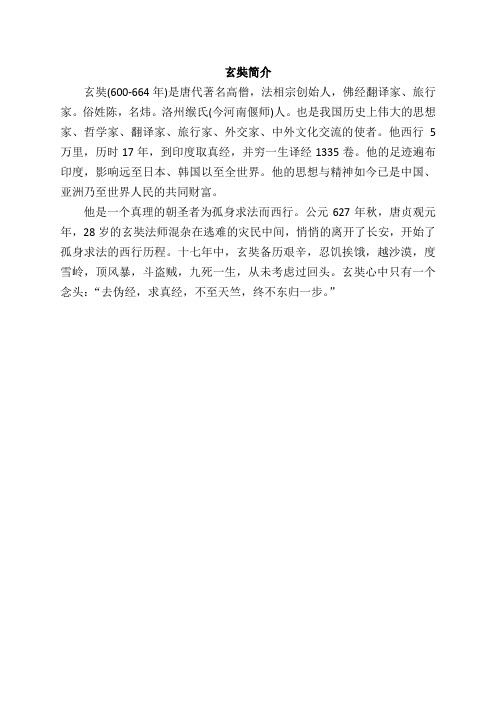
玄奘简介
玄奘(600-664年)是唐代著名高僧,法相宗创始人,佛经翻译家、旅行家。
俗姓陈,名炜。
洛州缑氏(今河南偃师)人。
也是我国历史上伟大的思想家、哲学家、翻译家、旅行家、外交家、中外文化交流的使者。
他西行5万里,历时17年,到印度取真经,并穷一生译经1335卷。
他的足迹遍布印度,影响远至日本、韩国以至全世界。
他的思想与精神如今已是中国、亚洲乃至世界人民的共同财富。
他是一个真理的朝圣者为孤身求法而西行。
公元627年秋,唐贞观元年,28岁的玄奘法师混杂在逃难的灾民中间,悄悄的离开了长安,开始了孤身求法的西行历程。
十七年中,玄奘备历艰辛,忍饥挨饿,越沙漠,度雪岭,顶风暴,斗盗贼,九死一生,从未考虑过回头。
玄奘心中只有一个念头:“去伪经,求真经,不至天竺,终不东归一步。
”。
对玄奘衣服的描写-概述说明以及解释

对玄奘衣服的描写-概述说明以及解释1.引言1.1 概述玄奘,全名玄奘三藏,是中国古代著名的高僧、翻译家和佛学家。
他于唐代七世纪前往印度取经,历经艰辛,终于将大量佛经翻译成中文,对佛教在中国的传播和发展做出了巨大贡献。
玄奘以其坚定的信仰、勇于探索的精神和对真理的追求,成为后世崇尚的楷模。
在玄奘的修行生涯中,他以清苦简朴的生活方式闻名。
尽管他面对艰难困顿,却总是坚守佛教的戒律和修行原则,一贯身着朴素的僧袍。
玄奘的衣服既是他修行的象征,也是他人格力量的体现。
本文将对玄奘的衣服进行详细的描写,以展现玄奘的形象及其修行之道。
首先,我们将从外观、材质和细节三个方面展开描写,并分析玄奘衣服的整体印象和其所承载的象征意义。
同时,我们还将探讨玄奘衣服的历史价值,以期更好地理解玄奘及其时代的文化背景。
通过对玄奘衣服的描写,我们不仅可以感受到古代僧人的信仰和修行坚持,也可以更深刻地了解佛教文化的魅力和玄奘传世的意义。
在这篇文章中,我们将用文字为读者勾勒出一幅关于玄奘衣服的生动画面,希望能够激发读者对佛教文化的兴趣,并传递出一种对于追求真理和智慧的美好追求。
1.2 文章结构文章结构的目的是为了给读者提供一个清晰的框架,使他们能够更好地理解和吸收文章的内容。
以下是本文的结构:2. 正文:2.1 玄奘衣服的外观描写:在这一部分,我们将详细描述玄奘衣服的外观特点,包括颜色、款式、设计和装饰等方面的描写。
通过生动的语言和形象的描述,读者可以更直观地体验玄奘衣服的外观魅力。
2.2 玄奘衣服的材质描写:这一部分将针对玄奘衣服的材质进行详细的描写,从纤维的质地、光泽度、柔软度以及手感等方面进行描述。
通过描绘材质的特点,读者可以更全面地了解玄奘衣服的质感和品质。
2.3 玄奘衣服的细节描写:在这一部分,我们将关注玄奘衣服的细节,包括衣领、袖口、纽扣、褶皱等方面的描写。
通过描绘细节,读者可以更加生动地感受到玄奘衣服的精致工艺和细腻之处。
3. 结论:3.1 对玄奘衣服的整体印象:这一部分将总结对玄奘衣服的整体印象,通过表达个人感受和观点,读者可以了解到作者对玄奘衣服所产生的整体印象。
论玄奘的佛经翻译原则

玄奘的佛经翻译原则:以信仰为基础,以语
言为媒介
玄奘是中国佛教史上一位伟大的翻译家,他所翻译的佛经至今仍
有极高的学术价值。
玄奘在翻译佛经的过程中,始终以信仰为基础,
以语言为媒介,遵循着一系列原则。
其中,最为重要的是:
一、以信仰为基础。
玄奘深信佛教精神,因此在翻译佛经时,总
是以佛教文化为基本准则。
他常说:“翻译佛经,声音必须清澈,以
表明其内涵不乱。
”
二、以语言为媒介。
玄奘十分注重语言的准确性。
他经常认真学
习当地的方言和语言,使译文的语言表达更为准确、完整。
如在某一
场合,他曾经说过:“要翻译好佛经,一定要精通当地的语言。
”
三、注重传统文化的融合。
玄奘在翻译佛经中,不仅注重准确性
和信仰深度,同时也注重传统文化的融合。
他在翻译中常常把印度佛
教思想与中国文化传统相融合,尤其是在释经的部分,更是将佛教思
想与中华文化巧妙地结合起来。
玄奘的佛经翻译原则不仅具有理论意义,更有指导作用。
他意识
到信仰在翻译中的重要作用,以信仰为基础,保证了译文的语言精确性;同时又注重传统文化的融合,使译文的思想深度得到提升。
这些
原则无疑可以为现代翻译工作者提供借鉴和启示,尤其是信仰的力量,为我们在翻译中遇到难题时提供了解决的方向和动力。
中国四大佛经翻译家
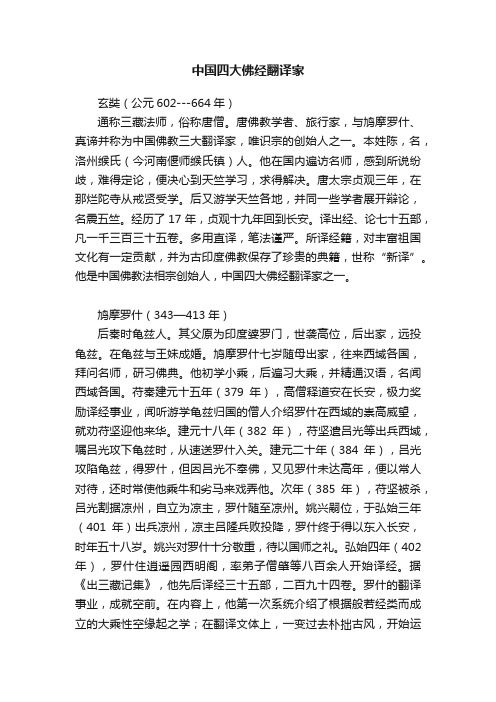
中国四大佛经翻译家玄奘(公元602---664年)通称三藏法师,俗称唐僧。
唐佛教学者、旅行家,与鸠摩罗什、真谛并称为中国佛教三大翻译家,唯识宗的创始人之一。
本姓陈,名,洛州缑氏(今河南偃师缑氏镇)人。
他在国内遍访名师,感到所说纷歧,难得定论,便决心到天竺学习,求得解决。
唐太宗贞观三年,在那烂陀寺从戒贤受学。
后又游学天竺各地,并同一些学者展开辩论,名震五竺。
经历了17年,贞观十九年回到长安。
译出经、论七十五部,凡一千三百三十五卷。
多用直译,笔法谨严。
所译经籍,对丰富祖国文化有一定贡献,并为古印度佛教保存了珍贵的典籍,世称“新译”。
他是中国佛教法相宗创始人,中国四大佛经翻译家之一。
鸠摩罗什(343—413年)后秦时龟兹人。
其父原为印度婆罗门,世袭高位,后出家,远投龟兹。
在龟兹与王妹成婚。
鸠摩罗什七岁随母出家,往来西域各国,拜问名师,研习佛典。
他初学小乘,后遍习大乘,并精通汉语,名闻西域各国。
苻秦建元十五年(379年),高僧释道安在长安,极力奖励译经事业,闻听游学龟兹归国的僧人介绍罗什在西域的崇高威望,就劝苻坚迎他来华。
建元十八年(382年),苻坚遣吕光等出兵西域,嘱吕光攻下龟兹时,从速送罗什入关。
建元二十年(384年),吕光攻陷龟兹,得罗什,但因吕光不奉佛,又见罗什未达高年,便以常人对待,还时常使他乘牛和劣马来戏弄他。
次年(385年),苻坚被杀,吕光割据凉州,自立为凉主,罗什随至凉州。
姚兴嗣位,于弘始三年(401年)出兵凉州,凉主吕隆兵败投降,罗什终于得以东入长安,时年五十八岁。
姚兴对罗什十分敬重,待以国师之礼。
弘始四年(402年),罗什住逍遥园西明阁,率弟子僧肇等八百余人开始译经。
据《出三藏记集》,他先后译经三十五部,二百九十四卷。
罗什的翻译事业,成就空前。
在内容上,他第一次系统介绍了根据般若经类而成立的大乘性空缘起之学;在翻译文体上,一变过去朴拙古风,开始运用意译之法,使中土诵习者易于接受理解,而为义学开辟了广阔园地。
古代翻译史中的玄奘
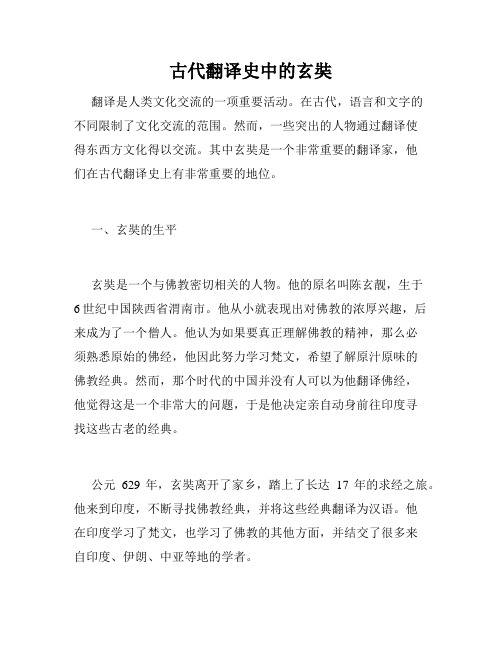
古代翻译史中的玄奘翻译是人类文化交流的一项重要活动。
在古代,语言和文字的不同限制了文化交流的范围。
然而,一些突出的人物通过翻译使得东西方文化得以交流。
其中玄奘是一个非常重要的翻译家,他们在古代翻译史上有非常重要的地位。
一、玄奘的生平玄奘是一个与佛教密切相关的人物。
他的原名叫陈玄靓,生于6世纪中国陕西省渭南市。
他从小就表现出对佛教的浓厚兴趣,后来成为了一个僧人。
他认为如果要真正理解佛教的精神,那么必须熟悉原始的佛经,他因此努力学习梵文,希望了解原汁原味的佛教经典。
然而,那个时代的中国并没有人可以为他翻译佛经,他觉得这是一个非常大的问题,于是他决定亲自动身前往印度寻找这些古老的经典。
公元629年,玄奘离开了家乡,踏上了长达17年的求经之旅。
他来到印度,不断寻找佛教经典,并将这些经典翻译为汉语。
他在印度学习了梵文,也学习了佛教的其他方面,并结交了很多来自印度、伊朗、中亚等地的学者。
公元645年,玄奘抵达中国的西安,带回了华严经等三百多万字的佛教经典,他的学问和勇气受到了很多人的钦佩。
他后来还创办了大雁塔,将出版物和图书投入其中,为后来的学术研究和文化传承建立了非常良好的基矗。
二、玄奘的意义玄奘的旅程和成就有着重要的历史意义。
首先,他的旅程通过翻译佛教经典,将印度佛教文化引入中国,起到了连接这两个文化圈之间的桥梁作用。
他的译文使得中国人能够领悟佛教的精神,并将佛教文化融入到了中国的思想和信仰体系学中,也促进了汉传佛教学说的发展;其次,玄奘的成就通过翻译文化交流,使得中国文化在世界上扩大了影响力。
他的翻译让印度书面语言的最纯粹的东西被传到了中国——这也是让中国的学者有机会了解当时世界上最先进的文化内容,为中国的文化发展留下了重要的痕迹;最后,作为一位求经远行者,玄奘还拓展了人们对于世界的认知。
他经历了长年的行走,跨足了不同的国度和文化,所以他的经历让人们能够认识到世界上的多样性和差异性,鼓励了世界的整体认知。
玄奘的贡献和影响

玄奘的贡献和影响玄奘(602年-664年),又名陈玄奘,俗姓陈,唐朝江苏宜兴人。
他是中国历史上著名的佛教传教士、翻译家、学者和旅行家。
玄奘的贡献和影响不仅在佛教界具有重要地位,也对中国文化和国际交流产生了深远的影响。
玄奘对佛教文化的贡献首先体现在他的翻译工作上。
他在前往印度取经的17年间,一共翻译了大约657部佛经,涉及诸多佛教经典,如《大般若经》、《法华经》、《楞严经》等。
这些翻译的佛经对于佛教在中国的传播起到了重要的推动作用,为后来的佛教发展奠定了基础。
同时,玄奘对佛经的翻译也对中国文化产生了深远的影响,使中国古代文化与世界佛教文化相互交融。
玄奘的旅行经历和著作对于中国与西方文化交流产生了积极的影响。
他的《大唐西域记》详细记录了他的旅行经历和所见所闻,向中国人民介绍了西域的风土人情、宗教信仰、历史文化等内容。
这部著作不仅成为了中国古代地理学、民族学和文化交流的重要参考,也为世界人民了解中国提供了宝贵的历史资料。
玄奘还在佛教思想和教义的传播上做出了重要贡献。
他将印度的佛教思想带回中国,推广了佛教的教义和教规,使佛教在中国的发展得到了进一步的推动。
他还倡导了“法相宗”,提出了“三论宗”和“三教合一”的思想,对佛教的发展和整合起到了积极的作用。
玄奘的影响不仅局限于佛教界,他的学术成就也对中国古代文化和哲学产生了深刻的影响。
他倡导的“译经学”研究方法,对后来的翻译事业起到了积极的推动作用。
他的学术传统也为后世学者提供了范本和指导。
同时,他的思想和理念也对中国古代文化和哲学产生了深远的影响,为中国古代思想史和文化史的研究提供了重要的参考。
总的来说,玄奘以其卓越的翻译成就、旅行经历和学术贡献,对佛教在中国的传播和中国文化的发展产生了重要的影响。
他的贡献不仅在佛教界被广泛认可和尊崇,也在中国文化史和世界文化交流史上占有重要地位。
正是因为玄奘的不懈努力,佛教得以在中国落地生根,并为中国文化的多元发展贡献了独特的智慧和价值。
唐僧人物小传600字
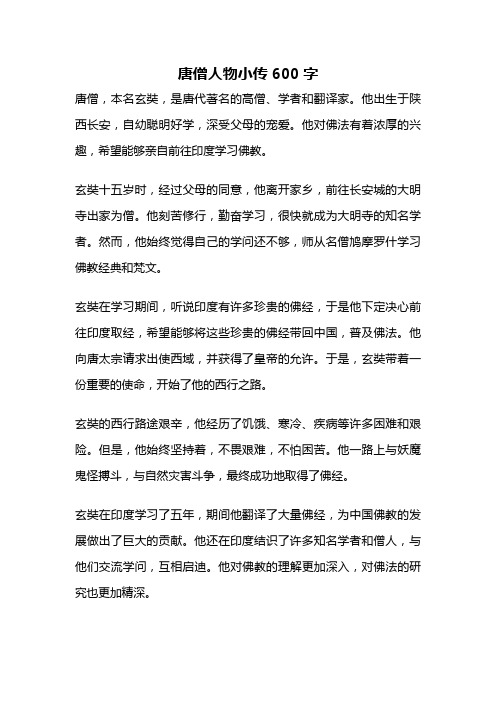
唐僧人物小传600字唐僧,本名玄奘,是唐代著名的高僧、学者和翻译家。
他出生于陕西长安,自幼聪明好学,深受父母的宠爱。
他对佛法有着浓厚的兴趣,希望能够亲自前往印度学习佛教。
玄奘十五岁时,经过父母的同意,他离开家乡,前往长安城的大明寺出家为僧。
他刻苦修行,勤奋学习,很快就成为大明寺的知名学者。
然而,他始终觉得自己的学问还不够,师从名僧鸠摩罗什学习佛教经典和梵文。
玄奘在学习期间,听说印度有许多珍贵的佛经,于是他下定决心前往印度取经,希望能够将这些珍贵的佛经带回中国,普及佛法。
他向唐太宗请求出使西域,并获得了皇帝的允许。
于是,玄奘带着一份重要的使命,开始了他的西行之路。
玄奘的西行路途艰辛,他经历了饥饿、寒冷、疾病等许多困难和艰险。
但是,他始终坚持着,不畏艰难,不怕困苦。
他一路上与妖魔鬼怪搏斗,与自然灾害斗争,最终成功地取得了佛经。
玄奘在印度学习了五年,期间他翻译了大量佛经,为中国佛教的发展做出了巨大的贡献。
他还在印度结识了许多知名学者和僧人,与他们交流学问,互相启迪。
他对佛教的理解更加深入,对佛法的研究也更加精深。
玄奘取回佛经后,他受到了唐朝皇帝和人民的热烈欢迎。
他将佛经翻译成中文,使更多的人能够阅读和学习。
他还在长安城建立了大唐西域佛教中心,为佛教的传播和弘扬做出了巨大的贡献。
玄奘晚年回到了大明寺,继续修行,继续翻译佛经。
他的学问和贡献为后世所称道,被尊称为“三藏法师”。
玄奘是一位卓越的人物,他以其坚定的信仰和不屈的精神,为佛教的传播和发展做出了巨大的贡献。
他的故事激励着后人,让人们明白了追求真理和智慧的重要性,也让人们明白了困难和挫折并不可怕,只要坚持不懈,就一定能够取得成功。
玄奘与翻译
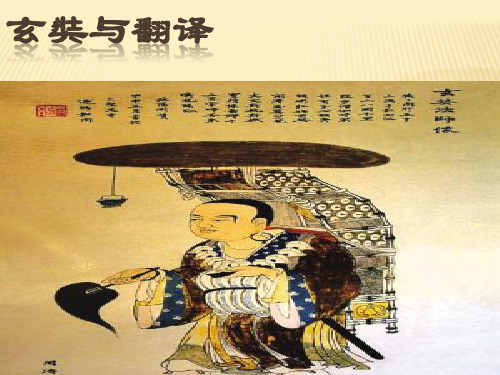
对后世影响——理论方面
玄奘的“五不翻”原则丰富了“异化策略” 的具体方法,起到了方法论的指导作用。玄 奘在“五不翻”中提到了因为“秘密”“多 含义”“此无”“顺古”“生善”而不翻的 情况,相比“异化”策略笼统的以“源语或 原文作者为归宿”要具体和具有操作性得多。
对后世影响——实践方面
译场的设置给当代汉语的外译如何挑选好 的翻译人员以反思和启示,即什么样的人 才能真正从事汉语外译,才能将汉语外译 做好。玄奘对译场的精心设置确保了翻译 求真务实,通达原意,达到语言上审美愉 悦的效果。这对汉语的外译如何达到“善 译”水平,取得“精译”效果有借鉴作用。
玄奘的翻译——翻译特点
1.
译经的数量众多、种类齐全。玄奘法师译出 的佛教经、律、论总量约占中国隋唐时期僧 侣译经总数的一半以上,比中国古代著名翻 译家鸠摩罗什、真谛、法护、义净、不空译 经的总和还要多,占到《大藏经》总数的近 三分之一。而且,翻译的经典种类齐全,内 容丰富。
玄奘的翻译——翻译特点
玄奘的翻译——翻译理论
1、“音不讹,语不谬” 玄奘在646 年完成《大唐西域记》,在其所撰序 言中提到: “然则佛兴西方,法流东国,通译音讹,方言语 谬,音讹则义失,语谬则理乖。故曰:“必也正 名乎”,贵无乖谬矣。” 他引用了孔子的话, 指出了翻译必须音不讹、语 不谬,才能义不失、理
玄奖通称“ 三藏法师” , 本姓陈, 名律, 公元六O 二 年出生在河南猴氏县的游仙乡(今惬师县维氏镇)。 他十三岁时在洛阳出家,十分勤学, 遏游长安、成熟、 荆州、相州、赵州等地, 访问师感到他们对佛教理 论所说纷绘, 难得定论。后来他听外僧波颇说, 印度 那烂陀寺戒货法师讲授“琦加师地” , 可以总括大 中小三来学说, 便决定去印度求学。 公元六二九年出发, 途经西域十六国, 历时四年才到 达北印度那烂陀寺, 从戒贤法师习经。他在印留学 十七年, 周游印度各地, 吸收了印度佛学的要义, 还 学通了因明(逻拜) 学、声明(文字音韵) 学和医方、 工艺等技术。他以自己的佛学理论与印度佛教学者 展开辪论, 名震五印。回国时携带梵文经典六百五 十七部, 数童之多, 收罗种类之富, 实为前所未有。
探讨玄奘对中国翻译事业的贡献

探讨玄奘的佛经翻译史及其贡献探讨玄奘的佛经翻译史及其贡献1,生平公元600年,玄奘出生在河南洛阳附近的一个小村庄,原名陈袆, 玄奘5岁的时候,母亲就去世了;10岁的时候,父亲去世,10岁的陈袆被僧人哥哥带入白马寺(白马寺:中国最早的寺院)。
公元612年,在一次全国性考试来选择27名剃度的僧人中,陈袆从数百名竞争者中脱颖而出,成为了当年27名僧人中年龄最小的一位,法号——玄奘。
当时13岁的陈袆还是一个不许进入考场的小沙弥,他的剃度显然是一个意外。
在佛教中,最高的是三藏法师,是遍通经律论三藏者的学位。
玄奘获得三藏法师的称号那一年,年仅24岁。
公元626年冬,玄奘向当时朝廷申请去天竺,唐太宗并没有理会一次次的请求。
公元627年秋,27岁的玄奘混入逃难的灾民中偷渡出关,从这一天开始,他踏上了一条充满未知数的道路。
玄奘法师在瓜州讲经时,一位名叫石磐陀的胡人来请法师为他受戒,自愿当玄奘的向导。
有学者认为这个石磐陀就是现在《西游记》当中孙悟空的化身,石磐陀是玄奘收第一个弟子,而且身份是向导。
这一点和孙悟空的身份非常吻合。
而且自从玄奘为石磐陀剃度以后,石磐陀这个胡人就成了一个胡僧,胡僧与孙悟空的俗称猢狲在发音上非常接近,会不会是在流传过程当中,发生了这样的音变呢?但是这个胡人没有像孙悟空一样坚持到底,在一次未遂的谋杀后胡人石磐陀一去不复返。
从这一刻开始,玄奘只剩下了孤身一人,而他的前方却是茫茫戈壁。
当玄奘躲避追捕寻找水源时,他迷路了,在沙漠中迷路显然是一件非常可怕的事情,不幸的是,最后一个水囊也被打翻。
茫茫戈壁中,玄奘四天五夜滴水未尽,奄奄一息。
于是这位虔诚的佛教徒躺在沙漠中默念观音。
对于玄奘而言,观音只是他保持生命的精神支柱,真正帮助他走出困境的是匹枣红色的瘦马,显然,这是一匹具有丰富旅行经验的老马,它把玄奘带到了一口泉水旁边。
走出戈壁,玄奘来到今天的哈密境内高昌国,高昌王鞠文泰与玄奘结拜,此时他的身份不再是一个偷渡出境的和沿,而是高昌王的御弟。
大雁塔唐玄奘的故事
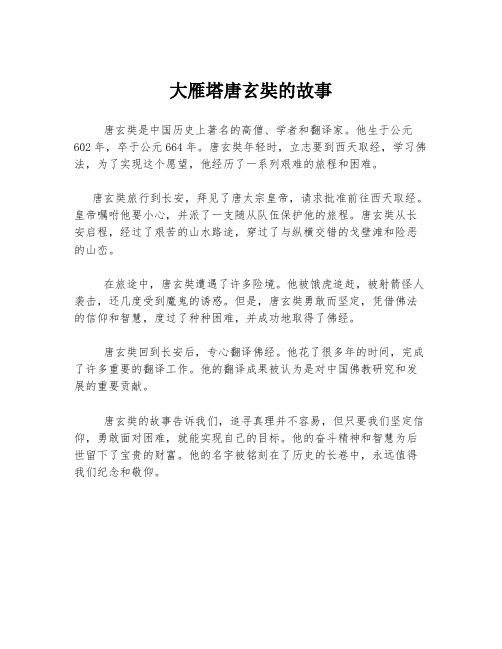
大雁塔唐玄奘的故事
唐玄奘是中国历史上著名的高僧、学者和翻译家。
他生于公元602年,卒于公元664年。
唐玄奘年轻时,立志要到西天取经,学习佛法,为了实现这个愿望,他经历了一系列艰难的旅程和困难。
唐玄奘旅行到长安,拜见了唐太宗皇帝,请求批准前往西天取经。
皇帝嘱咐他要小心,并派了一支随从队伍保护他的旅程。
唐玄奘从长安启程,经过了艰苦的山水路途,穿过了与纵横交错的戈壁滩和险恶的山峦。
在旅途中,唐玄奘遭遇了许多险境。
他被饿虎追赶,被射箭怪人袭击,还几度受到魔鬼的诱惑。
但是,唐玄奘勇敢而坚定,凭借佛法的信仰和智慧,度过了种种困难,并成功地取得了佛经。
唐玄奘回到长安后,专心翻译佛经。
他花了很多年的时间,完成了许多重要的翻译工作。
他的翻译成果被认为是对中国佛教研究和发展的重要贡献。
唐玄奘的故事告诉我们,追寻真理并不容易,但只要我们坚定信仰,勇敢面对困难,就能实现自己的目标。
他的奋斗精神和智慧为后世留下了宝贵的财富。
他的名字被铭刻在了历史的长卷中,永远值得我们纪念和敬仰。
玄奘简介及主要事迹

玄奘简介及主要事迹玄奘(602-664年),唐代高僧,我国汉传佛教四大佛经翻译家之一,中国汉传佛教唯识宗创始人。
玄奘原姓陈,名祎、洛阳缑氏(今河南偃师缑氏镇)人。
13岁出家,21岁受具足戒。
曾游历各地,参访名师,学习《涅槃经》《摄大乘论》《杂阿毗昙心论》《成实论》等经论。
因为感到各师所说不一,各种经典也不尽相同,于是决定西行求法,以统一诸说不一的矛盾。
629年(唐太宗贞观三年)玄奘自长安出发,经秦州、兰州、凉州,到达瓜州。
在瓜州,通过胡人向导,得谒敦煌太守,并从他那里得悉伊吾(今哈密)通往西域的捷径。
从此改变了原来取道兰州出玉门关的打算,决定从瓜州出发,入伊吾,经高昌(今吐鲁番),过焉耆、龟兹,再西行翻越葱岭,赴印度取经。
生平事迹如下:(一)西行取经:贞观元年(627年),玄奘向朝廷申请由丝绸之路去西天取经,但未获唐太宗批准。
然而他决心已定,“乃私往西域”。
这一去,就是17年。
(二)潜心译经:公元645年正月,玄奘回到长安。
唐太宗对玄奘的壮举感到十分赞赏,接见并劝慰他:“闻师言,大乘佛法,诸国此土均有传授,师何独舍近求远,更临荒野?”玄奘答道:“大乘教法甚转衰毁,兼赍此经为欲镇护国家,令其国界永无灾患。
”唐太宗觉得有理,对玄奘愈加敬重。
玄奘进入长安的第二年(公元646年),就在慈恩寺开始译经工作。
(三)创立慈恩寺:公元648年五月,西域于阗(今新疆和田)30位君王在于阗总督霍迦·索俱摩的陪同下,同玄奘相见。
于阗国王及诸位君王向玄奘致以崇高的敬意,远近的僧尼和当地名士向玄奘献上鲜花、水果,表达他们对这位大唐高僧的敬仰。
随后,于阗等地的30多位君王敦促玄奘在当地建寺造塔。
(四)晚年生活:公元651年四月,在唐高宗的支持下,大慈恩寺造塔落成,取名“慈恩寺塔”。
这座塔用砖砌成,初建时五层,后加盖至九层。
塔平面为方形,略显锥形,其顶旧损后不复见。
今高约60米,占地81亩。
此后不久,玄奘在慈恩寺专心致力于译经、讲经活动。
玄奘对中国翻译的贡献

玄奘对我国翻译的历史贡献江玉菡2008级2班20080510873摘要:玄奘是我国杰出的佛经翻译家,他翻译了大量佛经,是“新译”的创始人。
他提出的著名的“五不翻”原则及“既须求真,又须喻俗”的标准,对我国翻译事业有很大影响。
关键词:玄奘,佛经,翻译,影响Abstract:Xuanzang is an outstanding Chinese Buddhist translator. He translated a number of Scriptures, and he is the “founder of the new translation”. His famous theory of “The Five Kinds of Terms Not Translated”and his standard that “A good translation should be both faithful to the original and intelligible to the public”have a great impact on the interpretation of China.Key words: Xuanzang,Buddhist sutra,translation,influence引言玄奘(602年-664年),唐朝著名的“三藏法师”,与鸠摩罗什、真谛并称为中国佛教三大翻译家。
出家后遍访佛教名师,因感各派学说分歧,决心西行求法以释疑惑,往返17年,行程5万里,携回梵文经典650余部,是中印文化交流的使者。
回国后组织译经,译出经纶75部,1335卷,且译经质量,前所未有,所译之经被称为“新译”。
1.佛经“新译”的创世人我国佛经汉译从东汉时期就开始了,而时至唐朝,进入了全盛时期。
而唐代的翻译事业之所以这么繁荣,又要归功于这位“新译”的创人玄奘。
译经家把玄奘以前所译的经典称为“旧译”,自玄奘之后所译的经典称为“新译”。
唐僧主要事迹

唐僧主要事迹
唐僧(602年-664年),姓陈名玄奘,字真如,河南洛阳人,是中国唐朝时期的一位著名僧人、佛学家、翻译家和历史学家。
他十九岁出家,曾先后游学于长安大慈恩寺、洛阳灵宝寺,又赴印度亲自求学佛法,并翻译了大量佛典。
唐僧主要事迹有:
1. 西行取经:唐僧为了取回真经,历尽艰辛,与徒弟们一路经过了八十一难,克服了无数困难和危险,最终成功取得真经并带回中国。
2. 翻译佛典:唐僧在印度求学期间,先后翻译了《大唐西域记》、《大般若经》、《金刚经》等众多佛典,为中国佛教发展做出了杰出的贡献。
3. 修建寺庙:唐僧回国后,先后修建了齐州灵山寺、洛阳白马寺等多座寺庙,为佛教的传播和发展做出了重要的贡献。
4.传播佛法:唐僧不仅翻译了大量佛典,还为佛教在中国的传播做出了巨大的贡献,他的弟子们也成为了中国佛教的重要传播者。
总的来说,唐僧是一位伟大的佛教人物,在中国佛教史上留下了深刻的影响,他不仅修行精进,而且勇敢坚定,用自己的实际行动为后人树立了崇高的榜样。
- 1 -。
- 1、下载文档前请自行甄别文档内容的完整性,平台不提供额外的编辑、内容补充、找答案等附加服务。
- 2、"仅部分预览"的文档,不可在线预览部分如存在完整性等问题,可反馈申请退款(可完整预览的文档不适用该条件!)。
- 3、如文档侵犯您的权益,请联系客服反馈,我们会尽快为您处理(人工客服工作时间:9:00-18:30)。
All his translation works include 1330 fascicles of scriptures, such as: 《般若经》 《大悲咒》 《咒五首》
《西游记》中的玄奘
. On his return to China in AD 645, Xuanzang was greeted with much honour but he refused all high civil appointments offered by the still-reigning emperor, Emperor Taizong of Tang. Instead, he retired to a monastery and devoted his energy to translating Buddhist texts until his death in AD 664.
He brought with him some 657 Sanskrit (梵文)texts. Then drawing students and collaborators from all over East Asia to translate the texts. He is credited with the translation of some 1,330 fascicles of scriptures into Chinese.
His version of the Heart Sutra 《心经》is the basis for all Chinese commentaries on the sutra, and recitations throughout China, Korea and Japan. His style was, by Chinese standards, cumbersome and overly literal, and marked by scholarly innovations in terminology; usually, where another version by the earlier translator Kumārajīva exists, Kumārajīva's is more popular.
In 646, under the Emperor's request, Xuanzang completed his book Great Tang Records on the Western Regions (大唐西 域記), which has become one of the primary sources for the study of medieval Central Asia and India. This book was first translated into French by the Sinologist Stanislas Julien in 1857.
The First Translator in China
---A Famous Chinese Buddhist Monk
Made by : 侯莎
吕玲 马丽娟 蔡薇
Xuanzang 玄奘
A famous Chinese Buddhist monk, scholar, traveler, and translator who described the interaction between China and India in the early Tauanzang reportedly had a dream that convinced him to journey to India. During his journey, Xuanzang visited a great number of countries, which contributed a lot to his translation. Nineteen years later, he return to Tang Dynasty imperial capital Changan.
Xuanzang was born near Luoyang Henan in 602 . He was the youngest of four children. At his young age ,he expressed interest in becoming a Buddhist monk as one of his elder brothers had done. And then at the age of thirteen he entered Buddhist monkhood. Seven years later ,he was fully ordained as a monk.
